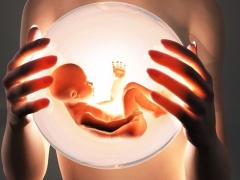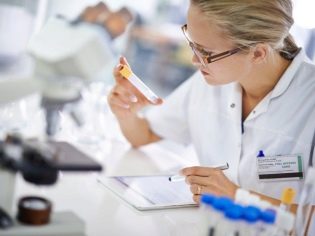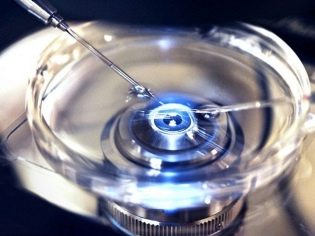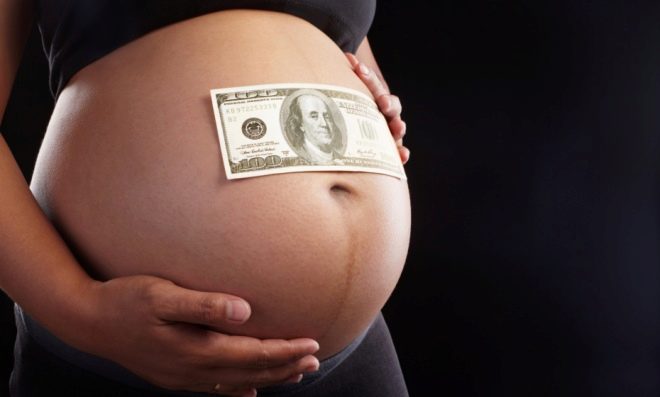All about egg donation
In some cases, donor eggs are required for IVF. This is necessary if a woman has a depleted ovarian reserve, if she has no ovaries and no own germ cells. In the desire to become a mother, a woman is rather difficult to stop, and on the offer of the doctor to use the patient's donor oocytes in most cases they agree. Where donor eggs come from, how to become a donor, how to use donor services and how much it costs, we will tell in this article.
Who can be a donor?
Egg donation is a good thing in all respects. Thanks to donors, every year thousands of infertile families get the opportunity to become parents. Oocyte donation gives women the opportunity at any age. The risks of having a baby with chromosomal pathologies are reduced to a minimum, even if the expectant mother is 50 years old, because donor eggs pass a hard selection, and donors are thoroughly diagnosed before donation, including for genetic disorders.
Egg donors are divided into anonymous and individual. An individual donor is a woman whom the barren patient herself found, with whom she reached an agreement, signed a contract. Payment of the survey for the donor in this case lies on the customer.
If a woman wants to become an anonymous donor, the Ministry of Health will act as her customer, and all examinations will be carried out at the expense of the state or private clinics, since then the resulting biomaterial becomes the full property of the clinic.
To the donor rather strict requirements. Only if a woman meets these basic requirements, and many tests and examinations have been successfully completed, can she be allowed to participate in the donation program and become a full participant in it. The commission is very strict, it will not be possible to deceive the doctors, because every conclusion is confirmed by analyzes and tests.
The legal status of the donor implies compliance with the terms of the contract and the terms of the donation program. According to him, a woman undertakes to fulfill all appointments, to provide in time all data about her state of health.
After donating eggs, a woman cannot claim them; they are transferred to the oocyte bank.
How is the procedure?
After all the surveys are left behind and the woman has been admitted to participate in the donation program, the preparatory stage begins. She is recommended diet for two weeks. In the diet should be vegetables and fruits, be sure to - meat and fish (vegetarianism - a contraindication!), Take foods boiled, baked or stewed. Excluded all fried, fatty, spicy and spicy. Alcohol should be completely excluded. A week before the scheduled date of the procedure can not have sex.
It is important for two weeks before putting the egg to give up physical activity (gym, jogging, bicycle), as well as not to visit the bath, solarium, sauna and not to take hot baths. You can swim in the shower in warm water.
The day of the collection of the egg is determined by the results of ultrasound and a blood test for LH (luteinizing hormone). As soon as the LH reaches its peak, a procedure is assigned.If you delay, ovulation will occur, and the egg will leave the bursting follicle.
Before the procedure of delivery of the egg for 8 hours do not eat and for two hours completely limit fluid intake. On the day of the procedure, the woman makes an enema. To enter the office must be on an empty stomach!
The ovum (and sometimes not one) is taken by the puncture method. Without appropriate anesthesia, it would be quite difficult for a woman to undergo such a procedure, so general anesthesia or local anesthesia can be done (patient or doctor’s choice). The woman is located on the gynecological chair, she is injected with painkillers, they wait for the anesthetic effect and a thin needle-catheter is inserted into the follicle through the posterior vaginal wall.
The whole process of egg collection is carried out under the control of ultrasound diagnostics. Most often it is possible to get 1 egg, less often - 2. The procedure lasts about a quarter of an hour. For 3-4 hours, a woman needs to stay in the hospital so that doctors can monitor her condition and well-being, after which she can go home.
The resulting eggs are carefully examined by experts, microscopically examined, placed with a nutrient medium.
If artificial fertilization is planned with fresh cells, it can be carried out immediately after assessing the quality of oocytes and after a couple of days, assessing the quality of embryos, transplant them into the uterus of a woman who is an IVF program with a donor oocyte.
If the egg donor is anonymous, the eggs obtained are frozen and placed in a demand cryobank. Frozen, they can be ultra-fast by immersion in extremely low temperatures, in liquid nitrogen, or slowly using a cryoprotectant fluid.
Basically, donor cells try to freeze by the method of windification - ultrafast freezing at a temperature of 196 degrees below zero. After it, the oocytes are more viable, they rarely die during thawing, their structure and membranes are not disturbed, and the intracellular fluid does not crystallize.
Frozen oocytes are stored in liquid nitrogen at a constant temperature of minus 196 degrees in special containers. When they become necessary, the cells are thawed in compliance with all technological requirements and fertilized for further transfer to the uterus of the participant in the IVF program.
In anticipation of the egg from the individual donor selected by the spouses, the menstrual cycles of the donor and the recipient are synchronized with the use of hormonal therapy.
How to choose an individual donor?
In Russia, unlike Israel and a number of other countries, egg donation is not prohibited among close relatives. So, one sister may well become a donor for the other. Therefore, a woman who has been shown artificial insemination with a donor oocyte may well use the right of independent choice of the donor. At the same time, it is necessary to remember about some important requirements.
After the couple is determined to be a donor, they should conclude an agreement, a sample of which can be taken at the clinic, where the couple plans to do IVF. The donor will also have to visit the treating physician of the sterile couple and get recommendations for additional examination and cell collection.
Cost of donor oocyte
There is no big “spreading” of prices for donor cells in different regions of Russia, because the cost is regulated by legislation and orders of the Ministry of Health. In private clinics, the cost is more expensive, in state hospitals it is cheaper. On average in the country for the right to use the donor cell will have to pay a fairly large amount - about 280 thousand rubles. IVF with its own egg costs about 130 thousand rubles.
How much will the donor receive?
Payment of the donor depends on its status. An anonymous donor receives on the day of the puncture the amount stipulated by the contract.Usually Rh-positive women receive about 35-50 thousand rubles, and women with a negative Rh factor will receive between 50 and 75 thousand rubles. Payment depends on the clinic, region, additional conditions.
If the donor has the status of an individual, then the payment of his services occurs by individual agreement between the parties. They pay him on the day of the collection of eggs, regardless of how many eggs were obtained as a result of puncture.
Implications for the donor
The procedure for donating oocytes does not represent a danger to the life and health of women. Complications in the process of egg collection usually does not occur. In rare cases, negative reactions to anesthesia are possible, but in order to prevent them, an experienced anesthesiologist will work with the woman.
A few hours after the puncture, the female donor may not feel very well. Most often, dizziness, nausea, vomiting may begin. Small pulling pains in the lower abdomen and in the back can be considered physiological, but if they increase, the pain becomes unbearable, you should call an ambulance.
After the procedure, swelling of the tissues (arms, legs, face) may appear, sleep may also be disturbed and the menstrual cycle may fail. Donating is thus not dangerous, the consequences are dangerous.
If the condition worsens one day after the procedure of collecting oocytes, one should consult a doctor to rule out complications.
As for the moral side of the issue, it can also be called a long-term consequence for the donor. According to reviews, many women who agreed to become donors, after a while, begin to regret it.
Egg donation is ambiguous in society, the church condemns it. But reproductive technologies have their own relationships with society and representatives of religion, and therefore it is up to you to become a donor or not. The use of donor eggs by almost all leading religions is condemned as immoral, and here too every couple has to decide for itself whether to take advantage of this opportunity or not.
Advantages of donation - in good pay. Cons - in possible complications for health and possible remorse. Recipients also need to weigh the pros and cons. The likelihood of pregnancy, the minimum risks to the health of the baby - this is of course a plus. Minus - also in the ethical side of the issue. And, of course, in the substantial cost of donor services.
According to statistics, in Russia with the use of a donor egg, about 10% of women with infertility as a result of IVF become pregnant each year. The number of donors cannot be calculated, since information about anonymous donors is kept in the strictest secrecy and does not appear in the reports.
- A woman’s age must be at least 18 and no more than 30 years old (in some cases and in some clinics it is allowed to become an oocyte donor up to and including 35 years old).
- The donor must have a child whom she conceived naturally.
- According to the results of a genetic examination, a woman should have no signs of phenotypic manifestation (mutation genes are completely excluded).
- According to the results of the medical examination, the woman must be completely healthy (the presence of at least one disease, chronic or acute, is completely excluded).
A woman should not have bad habits (nicotine, alcohol, drugs, etc.). Their absence should be confirmed by analyzes and conclusions from a narcologist, therapist, psychiatrist, etc.).
- There should be no blood relationship between the donor and the prospective father of the unborn child (an adult daughter cannot become an egg donor for the mother if she plans to conceive a second child from the same man from whom this adult daughter was conceived. A mother can become a donor for the daughter provided compliance with the above age limit).
- Look for the resemblance (remember that the oocyte carries half of the genetic information about the unborn child, the second half - the father.If the donor is a stranger, look at the type, facial features, distinctive features of appearance, so that the child still looked like his official parents).
- Find out the blood group and donor Rh factor (if the Rh factors and blood groups do not match, the donor and recipient are more likely to have an egg rejection, pregnancy subsides at an early period).
- Do not hesitate to ask the donor to show the medical record of your own child (read carefully the features of the child’s development, his history, the reasons for going to the doctor).
- Pay attention to the physique of the donor woman (optimally, if the donor and recipient have the most similar figures, be sure to ask about the hereditary tendency to be overweight. If the donor is much fuller than the recipient or much thinner, during pregnancy you may experience significant carrying).
- Do not underestimate the intellectual abilities of the donor (since intellectual abilities are transmitted genetically from mother and father due to the DNA in their germ cells, be sure to find out as much as possible about the donor - his education, work, hobbies, level of social adaptation).
- Conduct a full medical examination of the alleged donor (all specialized physicians, ECG, fluorography, all general tests, hormone tests in the blood plasma, urine, tests for antibodies to all common infections, as well as tests for HIV, syphilis, infections, sexually transmitted. Do not forget the certificate from a dentist, narcologist, psychiatrist).
The fact that you need to know the donor egg, see the following video.





























